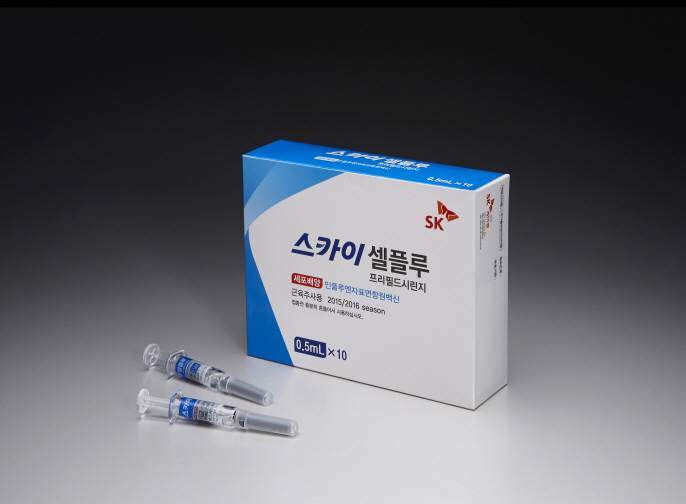● International medical journal Vaccine publishes, "SKYCellflu`s immunogenicity and safety confirmed in three-phase clinical trials for adults"
- Clinical results published in the medical journal Vaccine,
"Preventive effect for up to six months from the date of vaccination."
- Results announced at the ICAAC/ICC 2105 organized by the American Academy of Microbiology.
SKYCellflu®, Korea`s first cell-culture influenza vaccine, has been gaining results at home as well as abroad.
After having achieved sales of 2 million doses within the first three weeks of release, clinical results of the vaccine have been published in Vaccine, a renowned international medical journal.
SK chemicals (Man-hun Park, President) announced on the 7th of this month that the results of SKYCellflu`s Phase III (three) clinical trials for adults were published in the September issue of Vaccine. SKYCellflu is the world`s first commercially available cell-culture influenza vaccine for children/adolescents and first for adults in South Korea.
Vaccine is a global medical journal for vaccine and preventive medicine specialists, broadly covering subjects from basic research to practical medicine, and the journal is well-regarded for organically creating a synergy between academia and industry.
SK chemicals has attributed the success of its cell-culture influenza vaccine developed via proprietary technologies to its differentiation and internationally recognized safety.
According to the journal, SKYCellflu satisfied all criteria defined by the European Medicines Agency (EMA) in terms of influenza vaccine effectiveness (immunogenicity properties that may act as antigens, causing an immune response in the body) in clinical trials conducted in South Korea targeting 1,156 adults of 19 years of age or older. The vaccine showed similar level results against the control group in terms of safety.
In a long-term immunogenicity assessment, evaluating the persistence of the vaccine`s protective effect, SKYCellflu showed values exceeding the standard in most indicators. According to the long-term immunogenicity assessment, consumers could expect about 80% or more of a preventive effect for up to six months from the date of vaccination.
The journal also indicated that SKYCellflu is less susceptible to contamination in the production process and that production time is reduced when compared to existing influenza vaccines manufactured using fertilized eggs.
Based on such achievements, SK chemicals plans to actively promote the technology and efficacy of cell-culture influenza vaccines by participating in leading academic channels. SK chemicals` research team announced the results of the clinical trials to medical professionals from around the world at the ICAAC/ICC 2105 organized by the American Academy of Microbiology in San Diego, CA on September 17th.
Jae-ho Bae, Head of Marketing of SK chemicals` Life Science Business stated, "SKYCellflu`s safety and differentiating characteristics were recognized internationally." He added, "We will continue to focus on marketing to ensure that SKYCellflu captures a leading position in the influenza vaccine market."
SK chemicals received acclaim regarding SKYCellflu during a medical symposium held in Korea this past July through August, with the medical community predicting a paradigm shift in influenza vaccine production toward a cell-culture method. The company expects a further rise in awareness and confidence in Korea as well as abroad following publication of the clinical trials results in Vaccine.

[Photo]
SK chemicals` SKYCellflu, the world`s first cell-culture influenza vaccine for children and Korea`s first for adults.
# Reference: Article published in Vaccine medical journal
http://www.sciencedirect.com/science/article/pii/S0264410X15011561